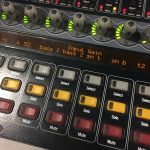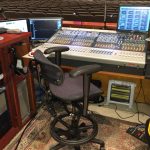My Three Rules
I don’t like “rules” in audio. I feel like early in my career as I started getting educated more and more by other engineers, I would frequently hear things that amounted to do this and don’t do that. While that information and those rules helped me develop my chops to a certain level, as I went deeper into my career and started getting closer to engineers at higher levels and exposed to their techniques and methods, I started finding more and more exceptions to those purported rules. Sometimes I even found that things I’d been taught were rules were actually holding me back. So I stopped trying to have rules because they’re often debatable and in a lot of situations they fall more into the category of opinion.
Now, that doesn’t mean there aren’t best practices. Personally, I think learning best practices can really come in handy when building your chops, and they’re a big part of the training I do these days. If I had never been taught them–even when they were expressed as rules–I don’t think I would be as successful these days especially when I’m going in the opposite direction. So I try and be really clear these days when I’m talking about best practices along with when we might think about breaking them because they are “best practices” and not “rules”.
That said, in spite of my best attempts to have no rules when it comes to audio production, somehow I’m now up to three. For a long time there was just one rule, and then I added a second rule. Then the other night I was thinking I need to add a third. I feel bad every time I add one of these because I don’t like rules, but perhaps rules can have some merit in some contexts. For example, I find these handy when I’m training.
The good news is these are just MY rules. These are not THE Rules. So you can do with these what you’d like especially if you’re like me and have a distaste for rules.
So without further ado, here are my rules.
1. Always Listen
Everything we do with audio should be based on what we are hearing. You’d think this goes without saying, but we have everything from visual feedback on gear to common audio wisdom along with the opinions of other engineers constantly fighting against this. At a recent training visit, one of the guys there pointed out how strange an EQ I had set seemed. My response was, “You’re listening with your eyes. Listen with your ears.”
Now, I’ll be honest. I do the same thing at times. I walk into a lot of situations these days where it’s hard not to pre-judge things based on how I see them set up or dialed in, and at this point in my career my instincts are pretty good. However, I always reserve final judgement until I’ve heard things because there are times where I have been pleasantly surprised.
We quickly forget that the people who listen to our work generally don’t see what we see or have any remote amount of knowledge about audio production like we do. They’re just going to listen to things. So we can’t let any distractions get in the way of using listening as the driving factor behind what we do.
2. Do No Harm
Whatever we do to a sound needs to make it better. If I turn off processing and it sounds better without the processing, that means I screwed up. This doesn’t mean everything needs to be hi-fi or clean or perfectly engineered, though. Sometimes adding distortion and grit and/or boatloads of EQ and compression make things better.
Now, this can easily fall into the realm of taste so there can be a bit of subjectivity in this which reminds me of one of my favorite George Martin quotes:
So, when in doubt, ask some friends if you’re making it better.
3. There Must Be a Good Reason
There must be a good reason behind everything we do. Doing something because I always do it or because I think I should or because I read somewhere or I saw this in a video aren’t generally good reasons. Every move we make should have intentionality behind it that follows behind the first two rules. We should not be engineering-by-numbers or playing mixing-roulette or trying to make things look pretty on a screen. We should be listening and making choices based on what we’re hearing to make things better.
So those are my rules. What do you think? Do you have any rules of your own? Leave a comment and tell me all about it.

 Previous Post
Previous Post Next Post
Next Post



I may be way off base here but my rule is ‘stay engaged’. I rarely take my hands off the faders. It irritates me when people talk in the booth (or even sing) because I can’t hear as well. Sometimes I feel like what I imagine an orchestral conductor might feel. Is it wrong to regard the board somewhat like an instrument you are playing?
I always thought David Morgan put it best when he said, “The console is my instrument, and I play the band.”